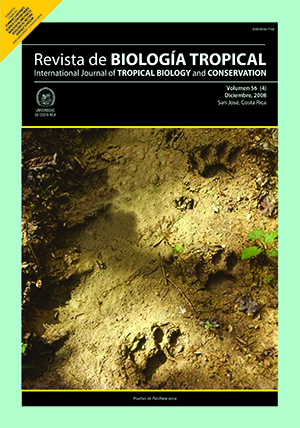Resumen
Bemisia tabaci is an important virus vector on a number of crops worldwide. Therefore, a preventive approach to deal with viral epidemics may be the deployment of repellents or phagodeterrents at earlier stages of plant development (critical period). Thus, the crude extract and four fractions thereof (water, water:methanol, methanol, and diethyl ether) of mother-of-cocoa (Gliricidia sepium, Fabaceae) were tested for phagodeterrence to B. tabaci adults under greenhouse conditions, on tomato plants, in Costa Rica. Both restricted-choice and unrestricted-choice experiments showed that the crude extract and some fractions exerted such effect on the insect. In the former (in sleeve cages), three fractions caused deterrence at doses as low as 0.1% (methanol), 0.5% (water:methanol) and 1.5% (diethyl ether). However, in the latter (plants exposed in a greenhouse) no one of the fractions performed well, suggesting that the deterrent principles somehow decomposed under the experimental conditions.Comentarios

Esta obra está bajo una licencia internacional Creative Commons Atribución 4.0.
Derechos de autor 2008 Revista de Biología Tropical
Descargas
Los datos de descargas todavía no están disponibles.






